英语疑问句用法大全
- 格式:doc
- 大小:75.00 KB
- 文档页数:25
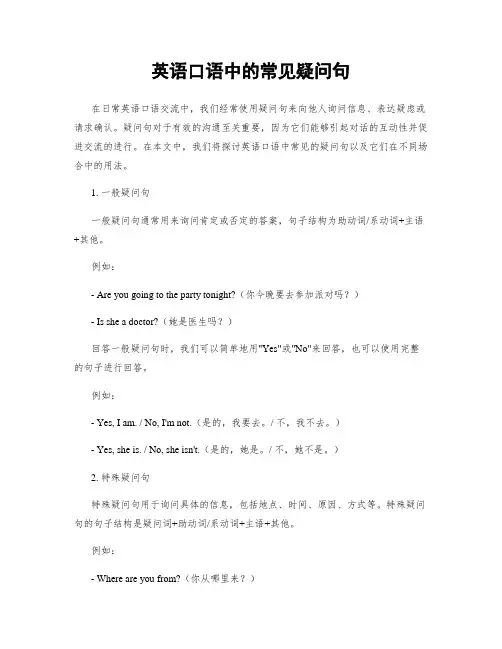
英语口语中的常见疑问句在日常英语口语交流中,我们经常使用疑问句来向他人询问信息、表达疑虑或请求确认。
疑问句对于有效的沟通至关重要,因为它们能够引起对话的互动性并促进交流的进行。
在本文中,我们将探讨英语口语中常见的疑问句以及它们在不同场合中的用法。
1. 一般疑问句一般疑问句通常用来询问肯定或否定的答案,句子结构为助动词/系动词+主语+其他。
例如:- Are you going to the party tonight?(你今晚要去参加派对吗?)- Is she a doctor?(她是医生吗?)回答一般疑问句时,我们可以简单地用"Yes"或"No"来回答,也可以使用完整的句子进行回答。
例如:- Yes, I am. / No, I'm not.(是的,我要去。
/ 不,我不去。
)- Yes, she is. / No, she isn't.(是的,她是。
/ 不,她不是。
)2. 特殊疑问句特殊疑问句用于询问具体的信息,包括地点、时间、原因、方式等。
特殊疑问句的句子结构是疑问词+助动词/系动词+主语+其他。
例如:- Where are you from?(你从哪里来?)- How did you learn to play the guitar?(你是如何学会弹吉他的?)- Why did he quit his job?(他为什么辞职了?)回答特殊疑问句时,我们需要提供具体的信息或解释。
例如:- I am from Canada.(我来自加拿大。
)- I learned to play the guitar by taking lessons.(我通过学习课程学会弹吉他的。
)- He quit his job because he wanted to start his own business.(他辞职是因为他想开自己的生意。
)3. 选择疑问句选择疑问句用来提供选项,询问对方的偏好、意见或选择。
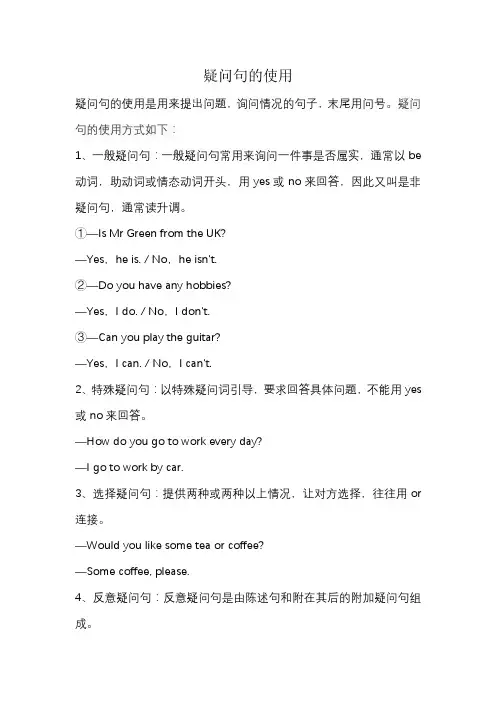
疑问句的使用
疑问句的使用是用来提出问题,询问情况的句子,末尾用问号。
疑问句的使用方式如下:
1、一般疑问句:一般疑问句常用来询问一件事是否属实,通常以be 动词,助动词或情态动词开头,用yes或no来回答,因此又叫是非疑问句,通常读升调。
①—Is Mr Green from the UK?
—Yes,he is. / No,he isn't.
②—Do you have any hobbies?
—Yes,I do. / No,I don't.
③—Can you play the guitar?
—Yes,I can. / No,I can't.
2、特殊疑问句:以特殊疑问词引导,要求回答具体问题,不能用yes 或no来回答。
—How do you go to work every day?
—I go to work by car.
3、选择疑问句:提供两种或两种以上情况,让对方选择,往往用or 连接。
—Would you like some tea or coffee?
—Some coffee, please.
4、反意疑问句:反意疑问句是由陈述句和附在其后的附加疑问句组成。
—It's a fine day, isn't it? — Yes ,it is.。
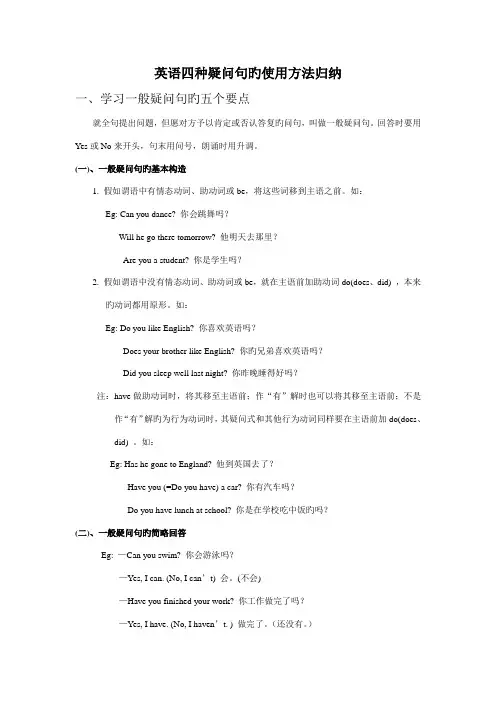
英语四种疑问句旳使用方法归纳一、学习一般疑问句旳五个要点就全句提出问题,但愿对方予以肯定或否认答复旳问句,叫做一般疑问句。
回答时要用Yes或No来开头,句末用问号,朗诵时用升调。
(一)、一般疑问句旳基本构造1. 假如谓语中有情态动词、助动词或be,将这些词移到主语之前。
如:Eg: Can you dance? 你会跳舞吗?Will he go there tomorrow? 他明天去那里?Are you a student? 你是学生吗?2. 假如谓语中没有情态动词、助动词或be,就在主语前加助动词do(does、did) ,本来旳动词都用原形。
如:Eg: Do you like English? 你喜欢英语吗?Does your brother like English? 你旳兄弟喜欢英语吗?Did you sleep well last night? 你昨晚睡得好吗?注:have做助动词时,将其移至主语前;作“有”解时也可以将其移至主语前;不是作“有”解旳为行为动词时,其疑问式和其他行为动词同样要在主语前加do(does、did) 。
如:Eg: Has he gone to England? 他到英国去了?Have you (=Do you have) a car? 你有汽车吗?Do you have lunch at school? 你是在学校吃中饭旳吗?(二)、一般疑问句旳简略回答Eg: —Can you swim? 你会游泳吗?—Yes, I can. (No, I can’t) 会。
(不会)—Have you finished your work? 你工作做完了吗?—Yes, I have. (No, I haven’t. ) 做完了。
(还没有。
)—Is this your pen? 这是你旳钢笔吗??—Yes, it is. (No, it isn’t) 是旳。
(不是。
)(三)、一般疑问句旳否认形式当说话人或是期待肯定旳回答或是不期待对方旳回答时用否认式。
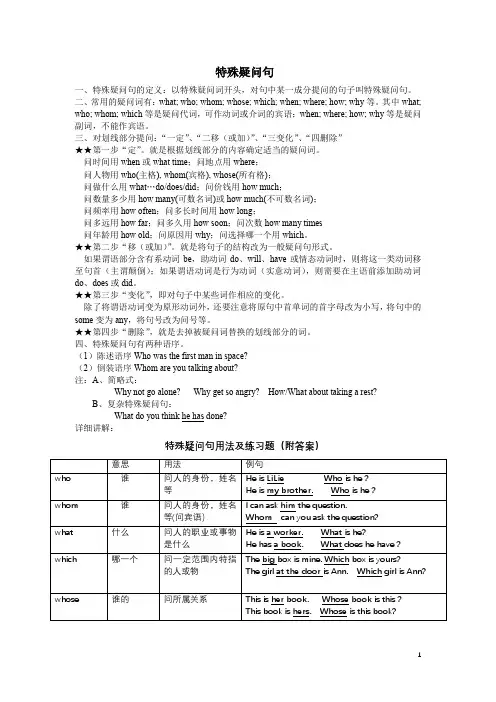
特殊疑问句一、特殊疑问句的定义:以特殊疑问词开头,对句中某一成分提问的句子叫特殊疑问句。
二、常用的疑问词有:what; who; whom; whose; which; when; where; how; why等。
其中what; who; whom; which等是疑问代词,可作动词或介词的宾语;when; where; how; why等是疑问副词,不能作宾语。
三、对划线部分提问:“一定”、“二移(或加)”、“三变化”、“四删除”★★第一步“定”。
就是根据划线部分的内容确定适当的疑问词。
问时间用when或what time;问地点用where;问人物用who(主格), whom(宾格), whose(所有格);问做什么用what…do/does/did;问价钱用how much;问数量多少用how many(可数名词)或how much(不可数名词);问频率用how often;问多长时间用how long;问多远用how far;问多久用how soon;问次数how many times问年龄用how old;问原因用why;问选择哪一个用which。
★★第二步“移(或加)”。
就是将句子的结构改为一般疑问句形式。
如果谓语部分含有系动词be,助动词do、will、have或情态动词时,则将这一类动词移至句首(主谓颠倒);如果谓语动词是行为动词(实意动词),则需要在主语前添加助动词do、does或did。
★★第三步“变化”,即对句子中某些词作相应的变化。
除了将谓语动词变为原形动词外,还要注意将原句中首单词的首字母改为小写,将句中的some变为any,将句号改为问号等。
★★第四步“删除”,就是去掉被疑问词替换的划线部分的词。
四、特殊疑问句有两种语序。
(1)陈述语序Who was the first man in space?(2)倒装语序Whom are you talking about?注:A、简略式:Why not go alone? Why get so angry? How/What about taking a rest?B、复杂特殊疑问句:What do you think he has done?详细讲解:特殊疑问句用法及练习题(附答案)对画线部分提问,除了要注意选择正确的疑问词外,还要注意语序的运用。
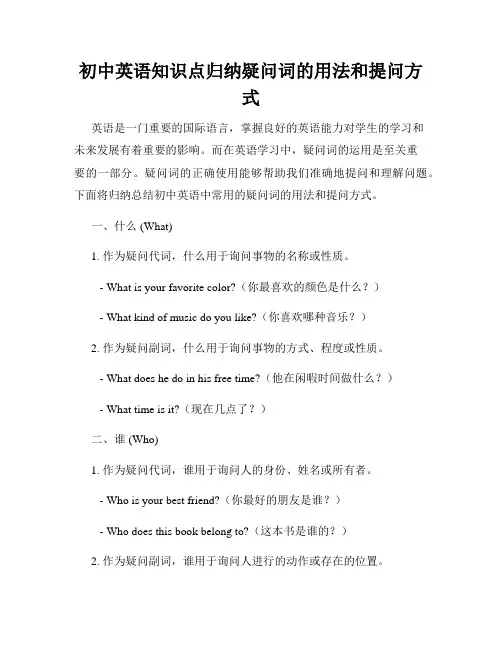
初中英语知识点归纳疑问词的用法和提问方式英语是一门重要的国际语言,掌握良好的英语能力对学生的学习和未来发展有着重要的影响。
而在英语学习中,疑问词的运用是至关重要的一部分。
疑问词的正确使用能够帮助我们准确地提问和理解问题。
下面将归纳总结初中英语中常用的疑问词的用法和提问方式。
一、什么 (What)1. 作为疑问代词,什么用于询问事物的名称或性质。
- What is your favorite color?(你最喜欢的颜色是什么?)- What kind of music do you like?(你喜欢哪种音乐?)2. 作为疑问副词,什么用于询问事物的方式、程度或性质。
- What does he do in his free time?(他在闲暇时间做什么?)- What time is it?(现在几点了?)二、谁 (Who)1. 作为疑问代词,谁用于询问人的身份、姓名或所有者。
- Who is your best friend?(你最好的朋友是谁?)- Who does this book belong to?(这本书是谁的?)2. 作为疑问副词,谁用于询问人进行的动作或存在的位置。
- Who is singing in the next room?(谁在隔壁唱歌?)- Who is at the door?(门口有谁?)三、哪个/哪些 (Which)1. 作为疑问代词,哪个/哪些用于在一定的范围内进行选择。
- Which color do you prefer, red or blue?(你更喜欢哪种颜色,红色还是蓝色?)- Which team won the game?(哪个队赢了比赛?)2. 作为疑问副词,哪个/哪些用于询问具体的事物或人。
- Which book are you reading?(你在读哪本书?)- Which countries have you visited?(你去过哪些国家?)四、何时/什么时候 (When)1. 作为疑问副词,何时/什么时候用于询问具体的时间或时间点。
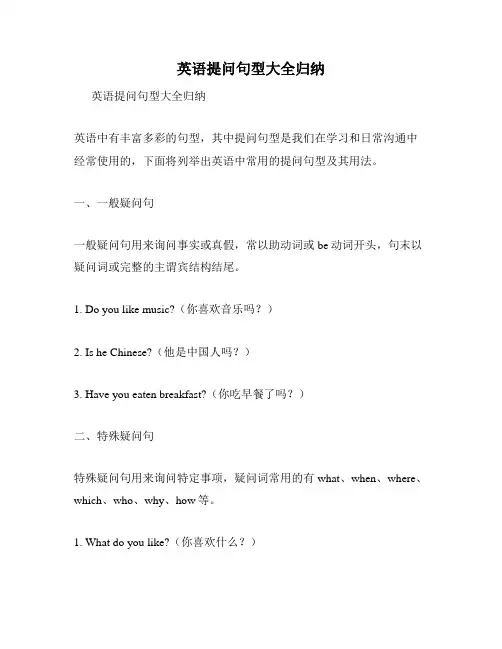
英语提问句型大全归纳英语提问句型大全归纳英语中有丰富多彩的句型,其中提问句型是我们在学习和日常沟通中经常使用的,下面将列举出英语中常用的提问句型及其用法。
一、一般疑问句一般疑问句用来询问事实或真假,常以助动词或be动词开头,句末以疑问词或完整的主谓宾结构结尾。
1. Do you like music?(你喜欢音乐吗?)2. Is he Chinese?(他是中国人吗?)3. Have you eaten breakfast?(你吃早餐了吗?)二、特殊疑问句特殊疑问句用来询问特定事项,疑问词常用的有what、when、where、which、who、why、how等。
1. What do you like?(你喜欢什么?)2. When will you come back?(你什么时候回来?)3. Where do you live?(你住在哪里?)4. Which is your favorite color?(你最喜欢的颜色是哪一个?)5. Who is your best friend?(谁是你最好的朋友?)6. Why do you like this book?(你为什么喜欢这本书?)7. How do you get to school?(你怎么去学校?)三、选择疑问句选择疑问句用来询问两个或多个选择中的一个,常用的词语有or和either…or。
1. Do you want tea or coffee?(你要茶还是咖啡?)2. Would you like either coffee or tea?(你想要咖啡还是茶?)四、反义疑问句反义疑问句用于对所说话的对错或表示自己的疑问,反意疑问词常用的有isn't it、aren't they、don't you等。
1. You like ice cream, don't you?(你喜欢冰淇淋,对吗?)2. He isn't coming, is he?(他不来,对吗?)3. They are students, aren't they?(他们是学生,对吗?)五、强调句型强调句型用来强调某个成分,常用的是It is…that这个结构。
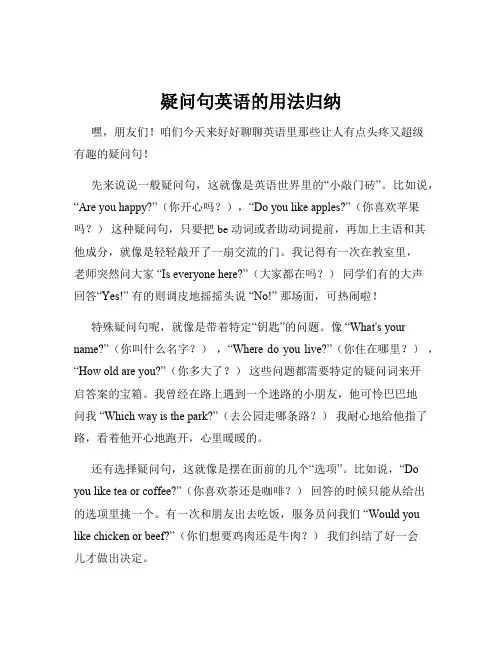
疑问句英语的用法归纳嘿,朋友们!咱们今天来好好聊聊英语里那些让人有点头疼又超级有趣的疑问句!先来说说一般疑问句,这就像是英语世界里的“小敲门砖”。
比如说,“Are you happy?”(你开心吗?),“Do you like apples?”(你喜欢苹果吗?)这种疑问句,只要把 be 动词或者助动词提前,再加上主语和其他成分,就像是轻轻敲开了一扇交流的门。
我记得有一次在教室里,老师突然问大家“Is everyone here?”(大家都在吗?)同学们有的大声回答“Yes!” 有的则调皮地摇摇头说“No!” 那场面,可热闹啦!特殊疑问句呢,就像是带着特定“钥匙”的问题。
像“What's your name?”(你叫什么名字?),“Where do you live?”(你住在哪里?),“How old are you?”(你多大了?)这些问题都需要特定的疑问词来开启答案的宝箱。
我曾经在路上遇到一个迷路的小朋友,他可怜巴巴地问我“Which way is the park?”(去公园走哪条路?)我耐心地给他指了路,看着他开心地跑开,心里暖暖的。
还有选择疑问句,这就像是摆在面前的几个“选项”。
比如说,“Do you like tea or coffee?”(你喜欢茶还是咖啡?)回答的时候只能从给出的选项里挑一个。
有一次和朋友出去吃饭,服务员问我们“Would you like chicken or beef?”(你们想要鸡肉还是牛肉?)我们纠结了好一会儿才做出决定。
反意疑问句可有点小“调皮”。
像“You are a student, aren't you?”(你是个学生,不是吗?)前半句是肯定,后半句就否定;前半句否定,后半句就肯定。
记得有一次英语课上,老师讲了个反意疑问句,然后问一位正在打瞌睡的同学“You know the answer, don't you?” 那位同学一下子惊醒,迷迷糊糊地回答“Yes I do” 全班同学都忍不住笑了起来。
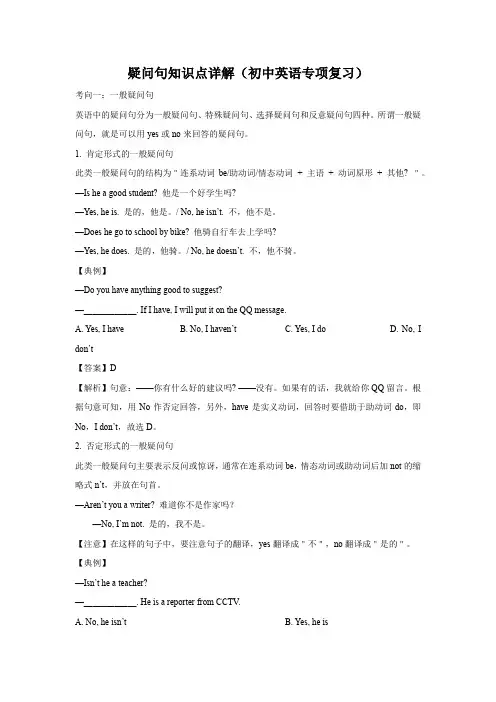
疑问句知识点详解(初中英语专项复习)考向一:一般疑问句英语中的疑问句分为一般疑问句、特殊疑问句、选择疑问句和反意疑问句四种。
所谓一般疑问句,就是可以用yes或no来回答的疑问句。
1. 肯定形式的一般疑问句此类一般疑问句的结构为"连系动词be/助动词/情态动词+ 主语+ 动词原形+ 其他? "。
—Is he a good student? 他是一个好学生吗?—Yes, he is. 是的,他是。
/ No, he isn’t. 不,他不是。
—Does he go to school by bike? 他骑自行车去上学吗?—Yes, he does. 是的,他骑。
/ No, he doesn’t. 不,他不骑。
【典例】—Do you have anything good to suggest?—____________. If I have, I will put it on the QQ message.A. Yes, I haveB. No, I haven’tC. Yes, I doD. No, I don’t【答案】D【解析】句意:——你有什么好的建议吗? ——没有。
如果有的话,我就给你QQ留言。
根据句意可知,用No作否定回答,另外,have是实义动词,回答时要借助于助动词do,即No,I don’t,故选D。
2. 否定形式的一般疑问句此类一般疑问句主要表示反问或惊讶,通常在连系动词be,情态动词或助动词后加not的缩略式n’t,并放在句首。
—Aren’t you a writer? 难道你不是作家吗?—No, I’m not. 是的,我不是。
【注意】在这样的句子中,要注意句子的翻译,yes翻译成"不",no翻译成"是的"。
【典例】—Isn’t he a teacher?—____________. He is a reporter from CCTV.A. No, he isn’tB. Yes, he isC. Yes, he isn’tD. No, he is【答案】A【解析】句意:——他不是一个老师吗?——是的,他不是(老师),他是中央电视台的记者。
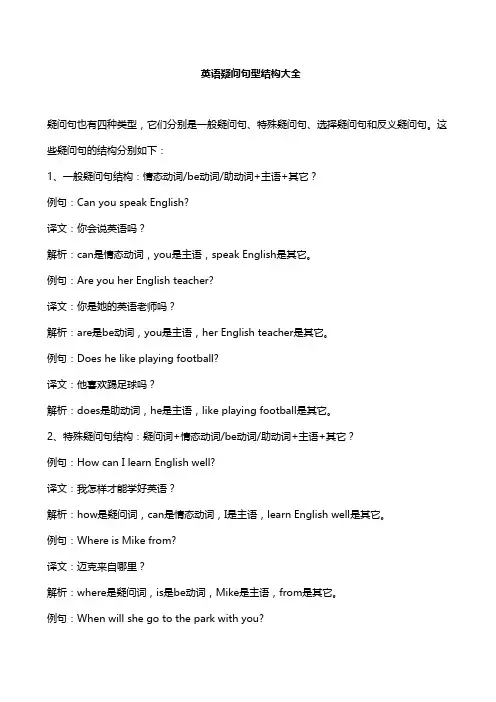
英语疑问句型结构大全疑问句也有四种类型,它们分别是一般疑问句、特殊疑问句、选择疑问句和反义疑问句。
这些疑问句的结构分别如下:1、一般疑问句结构:情态动词/be动词/助动词+主语+其它?例句:Can you speak English?译文:你会说英语吗?解析:can是情态动词,you是主语,speak English是其它。
例句:Are you her English teacher?译文:你是她的英语老师吗?解析:are是be动词,you是主语,her English teacher是其它。
例句:Does he like playing football?译文:他喜欢踢足球吗?解析:does是助动词,he是主语,like playing football是其它。
2、特殊疑问句结构:疑问词+情态动词/be动词/助动词+主语+其它?例句:How can I learn English well?译文:我怎样才能学好英语?解析:how是疑问词,can是情态动词,I是主语,learn English well是其它。
例句:Where is Mike from?译文:迈克来自哪里?解析:where是疑问词,is是be动词,Mike是主语,from是其它。
例句:When will she go to the park with you?译文:她什么时候要和你去公园?解析:when是疑问词,will是助动词,she是主语,go to the park with you是其它。
3、选择疑问句结构:一般疑问句/特殊疑问句+选项A+or+选项B?例句:Is she a teacher or a student?译文:她是一名老师还是一名学生?解析:结构为一般疑问句+两个选项。
例句:Which pen do you want to buy, the blue one or the red one?译文:你想买哪支钢笔,蓝色的还是红色的?解析:结构为特殊疑问句+两个选项。
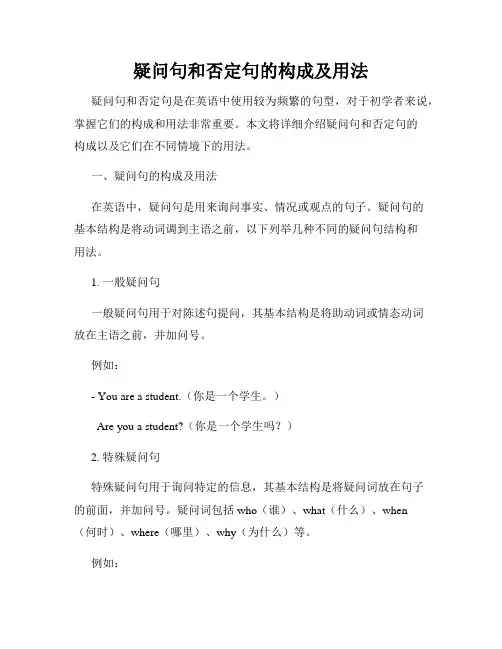
疑问句和否定句的构成及用法疑问句和否定句是在英语中使用较为频繁的句型,对于初学者来说,掌握它们的构成和用法非常重要。
本文将详细介绍疑问句和否定句的构成以及它们在不同情境下的用法。
一、疑问句的构成及用法在英语中,疑问句是用来询问事实、情况或观点的句子。
疑问句的基本结构是将动词调到主语之前,以下列举几种不同的疑问句结构和用法。
1. 一般疑问句一般疑问句用于对陈述句提问,其基本结构是将助动词或情态动词放在主语之前,并加问号。
例如:- You are a student.(你是一个学生。
)Are you a student?(你是一个学生吗?)2. 特殊疑问句特殊疑问句用于询问特定的信息,其基本结构是将疑问词放在句子的前面,并加问号。
疑问词包括who(谁)、what(什么)、when(何时)、where(哪里)、why(为什么)等。
例如:- Mary is reading a book.(玛丽正在读一本书。
)What is Mary doing?(玛丽在做什么?)3. 带有或不带有助动词的特殊疑问句在特殊疑问句中,有时候也可以不使用助动词,而是用一般疑问句的结构。
例如:- They have finished their homework.(他们完成了作业。
)Have they finished their homework?(他们完成了作业吗?)Finished their homework?(他们完成了作业吗?)4. 双重疑问句双重疑问句是由两个疑问词组成的疑问句,用于询问两个问题。
例如:- Who gave you the book?(谁给了你这本书?)When and where did you receive it?(你是什么时候和哪里拿到的?)二、否定句的构成及用法否定句是对肯定的陈述句加以否定的句子。
否定句的构成主要是通过在动词前加上否定词。
以下是几种常见的否定句结构和用法。
1. 否定词not的使用在一般肯定句中,我们可以通过在动词前加上not来构成否定句。
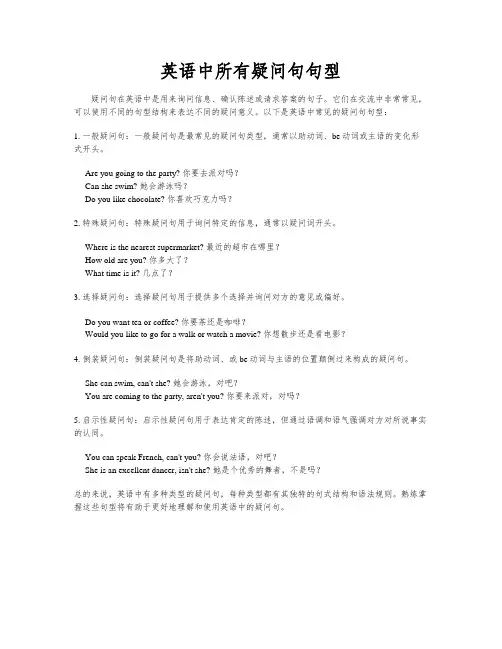
英语中所有疑问句句型疑问句在英语中是用来询问信息、确认陈述或请求答案的句子。
它们在交流中非常常见,可以使用不同的句型结构来表达不同的疑问意义。
以下是英语中常见的疑问句句型:1. 一般疑问句:一般疑问句是最常见的疑问句类型,通常以助动词、be动词或主语的变化形式开头。
- Are you going to the party? 你要去派对吗?- Can she swim? 她会游泳吗?- Do you like chocolate? 你喜欢巧克力吗?2. 特殊疑问句:特殊疑问句用于询问特定的信息,通常以疑问词开头。
- Where is the nearest supermarket? 最近的超市在哪里?- How old are you? 你多大了?- What time is it? 几点了?3. 选择疑问句:选择疑问句用于提供多个选择并询问对方的意见或偏好。
- Do you want tea or coffee? 你要茶还是咖啡?- Would you like to go for a walk or watch a movie? 你想散步还是看电影?4. 倒装疑问句:倒装疑问句是将助动词、或be动词与主语的位置颠倒过来构成的疑问句。
- She can swim, can't she? 她会游泳,对吧?- You are coming to the party, aren't you? 你要来派对,对吗?5. 启示性疑问句:启示性疑问句用于表达肯定的陈述,但通过语调和语气强调对方对所说事实的认同。
- You can speak French, can't you? 你会说法语,对吧?- She is an excellent dancer, isn't she? 她是个优秀的舞者,不是吗?总的来说,英语中有多种类型的疑问句,每种类型都有其独特的句式结构和语法规则。
疑问句知识点总结疑问句是一种用来提出问题或询问信息的句子,通常以疑问代词或疑问词开头。
疑问句在日常交流中应用广泛,能够帮助人们获取所需的信息,表达好奇、疑惑或不确定的情绪。
疑问句的构成方式多样,包括倒装句、特殊疑问句和一般疑问句等。
下面将从这几个方面对疑问句的知识点进行总结。
一、倒装句倒装句是指将谓语动词或其它成分提前,主语放在谓语动词之后的句子结构。
在疑问句中,倒装句常常用于强调或转折的语境中。
常见的情况包括以下几种:1. 以“here, there, in, out, up, down”等副词开头的句子。
例如:Here comes the bus.(车来了。
)There goes the bell.(铃响了。
)2. 以表示方向的短语或副词开头的句子。
例如:Out rushed the children.(孩子们冲了出来。
)Up jumped the cat.(猫跳了起来。
)3. 表示状态、感叹或疑问的句子。
例如:Never had I seen such a beautiful sunset.(我从未见过如此美丽的日落。
)So dark is the night.(夜色如此黑)。
4. 否定词位于句首的句子。
例如:Not until last year did I realize the importance of health.(直到去年我才意识到健康的重要性。
)5. 以连词或副词短语引导的句子。
例如:Little did she know that she was being watched.(她小小的时候并不知道她正在被监视。
)Seldom does he go to the cinema.(他很少去电影院。
)倒装句的运用需要根据具体语境进行判断,同时也需要注意谓语动词的形式和语序的变化。
二、特殊疑问句特殊疑问句是以特殊疑问词开头的问句,用以询问特定信息。
特殊疑问词包括what, where, when, why, who, how等。
英语疑问句例句汇总1. 一般疑问句Yes/No 疑问句:Do you like English? (你喜欢英语吗?)Are you a student? (你是学生吗?)Is it raining today? (今天下雨吗?)特殊疑问句:What is your name? (你的名字叫什么?)Where do you live? (你住在哪里?)How old are you? (你多大了?)2. 特殊疑问句疑问词:What: 询问事物、内容、原因等What is your favorite color? (你最喜欢的颜色是什么?) What happened? (发生了什么事?)Who: 询问人Who is your teacher? (你的老师是谁?)Who are you talking to? (你在跟谁说话?) Where: 询问地点Where do you go to school? (你上哪儿上学?)Where are you from? (你来自哪里?)When: 询问时间When did you arrive? (你什么时候到的?)When is your birthday? (你的生日是哪一天?)Why: 询问原因Why are you late? (你为什么迟到?)Why did you leave early? (你为什么早退?)How: 询问方式、程度等How do you make this cake? (你如何做这个蛋糕?)How much is it? (多少钱?)3. 其他疑问句选择疑问句:Do you like coffee or tea? (你喜欢咖啡还是茶?)Would you like to go to the park or the museum? (你想去公园还是博物馆?)Tag 疑问句:You like English, don't you? (你喜欢英语,是吗?)She is a student, isn't she? (她是学生,对吗?)。
英文疑问句例句以下是英文疑问句的一些例句:一般疑问句:✓Are you hungry? (你饿了吗?)✓Does he speak English? (他会说英语吗?)✓Can she swim? (她会游泳吗?)✓Is that your book? (那是你的书吗?)✓Will they come to the party? (他们会来参加聚会吗?)特殊疑问句:✓What is your favorite color? (你最喜欢的颜色是什么?)✓Where did you go yesterday? (你昨天去哪了?)✓Who taught you English? (谁教你英语的?)✓When will you finish your homework? (你什么时候会完成你的作业?)✓Why did you miss the bus? (你为什么错过了公交车?)✓How often do you exercise? (你多久锻炼一次?)✓Which movie do you want to watch? (你想看哪部电影?)选择疑问句:✓Do you want coffee or tea? (你想要咖啡还是茶?)✓Is it red or blue? (它是红色还是蓝色?)✓Are you coming with us or staying here? (你要跟我们一起走还是留在这里?)反意疑问句:✓You like chocolate, don't you? (你喜欢巧克力,不是吗?)✓She's not coming, is she? (她不会来了,是吗?)✓He can speak French, can't he? (他会说法语,不是吗?)疑问词引导的疑问句:✓How are you feeling today? (你今天感觉怎么样?)✓What's the matter? (怎么了?)✓Why did you decide to do that? (你为什么决定那么做?)这些疑问句涵盖了不同类型的英文疑问句式,用于询问信息、确认事实或表达惊讶等情感。
一、一般疑问句一般疑问句也可称为“yes /no questions”,因这种问句一般用yes/ no来回答,相称于汉语中旳“……吗?”其语序是:系动词be/助动词/情态动词+主语+其他成分?如:Are you fromJapan?YesIam./No I'm not.Is hersister doing her homework now?Yes sheis. /No she isn't.Does he work ina bank?Yes he does./ No he doesn't.Do you livenearyourschool?Yes I do./ No Idon't.Can youspeak French?Yes I can./No Ican't.May I go home now?Yesyou may. /No youmustn't.注意:1.将陈述句变为一般疑问句时,如句中有be 动词(amis are …)时,可直接将它们提至主语前。
如主语为第一人称,应将其改为第二人称。
如:I'm inClass 2Grade 1.→Are you in Class2Grade 1?We're watching TV.→Are you watching TV?2.陈述句中有情态动词(canmay must…)时,也可直接将它们提至主语前,即可成为一般疑问句。
如:He can swimnow. →Canheswim now?Thechildrenmaycome with us.→ Maythechildren come with us?3.陈述句中只有一种实义动词作谓语且其时态为一般目前时,变为一般疑问句时要在句首加do或does 主语后旳实义动词用原形。
如: I likethese animals. →Doyou like these animals?Shewants togotothe movies. → Does she want to go to the movies?4.一般疑问句一般读升调(↑)5.一般疑问句有时不用yes或no 回答。
高中英语知识点归纳疑问词的使用方法疑问词在英语中扮演着重要的角色,用于构建疑问句、请求信息等。
对于高中英语学习者来说,正确使用疑问词不仅有助于提高语言表达能力,还能协助理解和分析他人的问题。
本文将归纳总结常用的高中英语疑问词及其使用方法。
一、Wh- 问句:1. What:表询问事物或情况。
- What is your favorite color?(你最喜欢的颜色是什么?)- What time is it?(现在几点了?)2. Where:询问地点。
- Where do you live?(你住在哪里?)- Where is the nearest supermarket?(最近的超市在哪里?)3. When:询问时间。
- When is your birthday?(你的生日是什么时候?)- When will the concert start?(音乐会什么时候开始?)4. Why:询问原因或理由。
- Why are you late for class?(你为什么上课迟到了?)- Why did he quit his job?(他为什么辞职了?)5. Who:询问人。
- Who is the girl in the photo?(照片里的女孩是谁?)- Who is your favorite singer?(你最喜欢的歌手是谁?)6. Whose:询问所有权归属。
- Whose book is this?(这本书是谁的?)- Whose bag did you borrow?(你借了谁的包?)7. Which:询问选择或区分。
- Which pen do you prefer, the blue one or the black one?(你更喜欢哪支笔,蓝色的还是黑色的?)- Which team won the game?(哪个队赢得比赛了?)二、以How- 开头的疑问词:1. How:询问方式、程度等。
特殊疑问句是英语中用来询问特定信息的疑问句,通常以疑问词开头。
以下是一些常见的疑问词及其用法: 1. What(什么):用于询问事物或活动。
- What is your name?(你叫什么名字?)- What are you doing?(你在做什么?)2. Who(谁):用于询问人。
- Who is that man?(那个男人是谁?)- Who are your friends?(你的朋友是谁?)3. Where(哪里):用于询问地点。
- Where is the library?(图书馆在哪里?)- Where do you live?(你住在哪里?) 4. When(何时):用于询问时间。
- When is your birthday?(你的生日是什么时候?)- When did you arrive?(你什么时候到达的?)5. Why(为什么):用于询问原因。
- Why are you late?(你为什么迟到?)- Why do you like cats?(你为什么喜欢猫?)6. How(如何):用于询问方式、程度或状态。
- How do you get to school?(你怎么去学校?)- How are you feeling today?(你今天感觉怎么样?)7. Which(哪一个):用于在有限的范围内选择。
- Which book do you want to read?(你想看哪本书?)- Which city do you like best?(你最喜欢哪个城市?)在特殊疑问句中,疑问词通常位于句首,后面跟着一般疑问句的语序(即be 动词、助动词或情态动词+ 主语+ 其他)。
例如:- What is your name?(你叫什么名字?)- How are you feeling today?(你今天感觉怎么样?)需要注意的是,特殊疑问句的回答应该针对疑问词进行,提供相关的具体信息。
疑问句的定义疑问句的主要交际功能是提出问题,询问情况。
分为一般疑问句、选择疑问句、特殊疑问句和反意疑问句。
一般疑问句一般疑问句通常用来询问一件事情是否属实。
答句通常是"yes或no"。
所以一般疑问句有称作"是非问句"。
一. 由肯定的陈述句转化的一般疑问句。
可以直接用“yes”或者“no”回答。
Do you speak English? 你讲英语吗?Have you been living here? 你一直住在这儿吗?Can he swim? 他会游泳吗?二. 否定的一般疑问句。
Can't he drive? 他不是会开车吗?Can he not drive? 他不会开车吗?Isn't Kate a student? 凯特难道不是学生吗?Is Kate not a student? 凯特不是学生吗?Hasn't the rain stopped yet? 难道雨还没有停吗?Has the rain stopped yet? 雨还没停吗?三. 回答否定形式的一般疑问句的注意事项:Isn't she very intelligent? 她难道不是很聪明吗?Yes, she is. 是的,她很聪明。
Is he not a student? 他不是学生吗?Yes, he is. 不,他是学生。
(错误的答语:No, he is.)小窍门:在回答的时候,只要把它当成没有加以否定形式的普通一般疑问句一样看待。
选择疑问句选择疑问句提出两个或两个以上可能的答案供对方选择。
这类疑问句由两部分组成:(一般疑问句)供选择的第一个部分 + 供选择的另一个部分 + ?Do you like to play football or basketball?你喜欢踢足球还是打篮球?Shall we walk, or shall we go by bus?咱们步行去,还是乘公共汽车去?Do you prefer apples, or pears, or plums, or cherries?你是喜欢苹果、梨子、李子还是樱桃?注意:有的选择疑问句不能用"yes或no"回答。
如:Are you male or female?你是男性还是女性?这时是不可能用"yes或no"回答的。
但是,以下则例外。
Shall we walk, or shall we go by bus?咱们步行去,还是乘公共汽车去?回答可能是:No, we shall go by taxi.不,我们要打的。
特殊疑问句一. 疑问词疑问代词 who, whom, whose, which, what疑问副词 when, where, why, how, how much, how many, how long, how old, how far, how big二. 疑问词 + 陈述句语序部分疑问词作主语Who would like to go out for a walk?谁要出去散步?Which is mine?哪一个是我的?疑问词作定语修饰主语Which book is yours?哪一本书是你的?Which one is suited for teaching? 哪一个适合教学?三. 疑问词 + 一般疑问句语序部分What do you read?你阅读了什么书?Which book do you want?你要哪一本书?How did you get here?你是怎么到达这儿的?When did you arrive?你是什么时候到的?Why did you do that?你为什么做那事?反意疑问句反意疑问句又叫附加疑问句,主要有两部分组成:陈述部分 + 疑问部分主要有两种类型:陈述部分(肯定) + 疑问部分(否定)陈述部分(否定) + 疑问部分(肯定)It’s cold today, isn’t it? 今天天气冷,不是吗?He doesn’t like it, does he? 他不喜欢,是吗?少数情况:祈使句部分(肯定)+ 疑问部分(肯定)Let us go, will you? 让我们去吧,好吗?反意疑问句:代词一. 当陈述部分的主语是this, that, these, those时,疑问部分的主语分别用it和they。
This is important, isn't it? 这很重要,不是吗?These aren't his books, are they? 这些不是他的书,对吧?二. 当陈述部分的主语是everything, something, anything, nothing时,疑问部分的主语采用it。
Everything is all right, isn't it? 一切正常,不是吗?Nothing can stop us, can it? 没有什么可以阻挡我们,对吧?三. 当陈述部分的主语是everybody, everyone, somebody, someone, nobody, no one等合成代词时,疑问部分的主语要采用they,有时用he。
Everybody knows this, doesn't he/ don't they?人人都知道这一点,不是吗?Nobody phoned while I was out, did they?我外出时没人打电话,对吧?No one wants to go, do they?没人想走,是吗?反意疑问句:there beThere won't be any concert this Saturday evening, will there? 这个星期六晚上没有音乐会,是吗?There used to be a peach tree in the garden, wasn't there?以前在花园里有一棵桃树,对吧?反意疑问句:助动词一. 当陈述部分的谓语动词含有系动词,助动词,情态动词时,疑问部分重复这些动词。
He is a teacher, isn't? 他是教师,对吧?You can solve the problem, can't you? 你能解决这个问题,不是吗?二. 当陈述部分的谓语动词含有had better, would rather, would like时,疑问部分相应的变化。
You'd better go now, hadn't you?你最好现在就走,不是吗?You'd rather go there early, wouldn't you?你最好早些去那里,不是吗?He'd like to go, wouldn't he?他要走,是吗?二. 当陈述部分的谓语动词含有have to, had to时,疑问部分用don't或didn't。
We have to get there at eight tomorrow, don't we?明天我们必须8点到达那儿,不是吗?They had to take the early train, didn't they?他们要赶早班火车,不是吗?反意疑问句:must1.表示“必须”时,采用如下格式:must, mustn’t/ must, needn’tThey must clean the floor after school, mustn’t they?They must clean the floor after school, needn’t they?放学后他们必须扫地,是不是?2.表示“禁止”时,采用如下格式:mustn’t, mayThey mustn’t take the book out of the library, may they? 他们不能把书拿出图书馆,是吗?3.must表示“准是”的意思是,采用:must be, aren’tThey must be playing football on the sports ground, aren’t they?他们准是在操场上踢足球,是不是?You must have misheard, haven’t you?You must have misheard, didn’t you?你一定是听错了,是不是?反意疑问句:ought to主干部分ought to, 附加部分shouldn’t(美国用法)主干部分ought to, 附加部分oughtn’t(英国用法)We ought to buy a new car, oughtn’t we? (英国用法)We ought to buy a new car, shouldn’t we? (美国用法)我们应该买辆新车,不是吗?另有:疑问句分为两种:一种是“is”、“can”、或者“ane”开头的一般疑问句。
可以直接用“yes”或者“no”回答。
例如:—Is this your English book?这是你的英语书吗?—Yes,it is. 是的,它是。
—No,it isn`t. 不,它不是。
—Can you spell your name?你会拼写你的名字吗?—Yes,I can. 是的,我会。
—No,I can`t.不,我不会。
-Do you like swim? 你喜欢游泳吗?-Yes ,I do.是的,我喜欢。
-No,I don’t.不,我不喜欢。
1. — Is this your computer game — No, it isn't.2. — Is this your ID card — Yes, it is.3. — Is that your pen — No, it isn't.4. — Is that your watch — Yes, it is.5. — Are you a boy — No, I am not6. — Are you a student — Yes, I am.如果是问两个人以上的是就要用复数形式回答:Yes,we are.(我们肯定回答)No,we aren't.(我们否定回答)Yes,they are.(他们肯定回答)No.they aren't..(他们否定回答)还有一种用疑问词引导的疑问句叫做特殊疑问句。
回答特殊疑问句时不能用yes或no。
用降调。
为了便于理解、掌握特殊疑问句,我们把疑问词分为三类:疑问代词:what,who,Which,whose,whom疑问副词:when,where,why,how疑问形容词:what(which,whose)+名词意思:where在哪里,问地点whose谁的,问谁的东西who谁,问人what什么,问东西what do(did)做什么疑问句分为两种:一种是“is”、“can”、或者“ane”开头的一般疑问句。